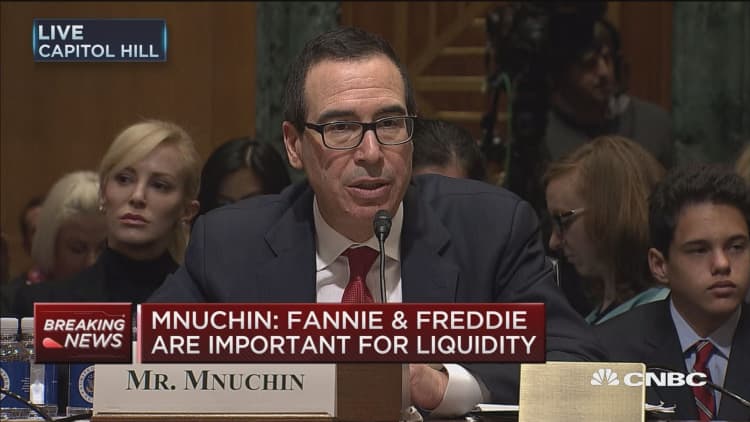Mortgage giant Fannie Mae is getting into the single-family rental business in a big way.
The government-backed agency said it is going into business with private equity giant and major housing player Blackstone by backing $1 billion in debt. Blackstone's Invitation Homes filed for an initial public offering this week, and the Fannie Mae relationship was disclosed afterward. Blackstone is looking to raise $1.6 billion by selling shares to the public.
Fannie Mae, currently under government conservatorship, will back $1 billion in debt collateralized by rental homes owned by Blackstone.
Invitation Homes currently has a portfolio of about 50,000 single family rental homes, most of which it purchased during the foreclosure crisis. Invitation Homes, in the filing, reported $9.7 billion in property and $7.7 billion in debt. The homes that will go into the Fannie Mae are, according to sources, low risk, with very low loan-to-value ratios. This first-of-its-kind debt deal is something of a test in what is a growing and maturing single-family rental market.
Both Fannie Mae and Freddie Mac have long been big players in the multifamily apartment market. Following the foreclosure crisis, when investors bought thousands of distressed homes, the single-family rental market grew and now accounts for more than 50 percent of the rental market nationally. This is likely why Fannie Mae is testing this market with the first deal.
"This transaction is a great opportunity to continue to serve the growing single-family rental market," according to a statement from Fannie Mae. "Invitation Homes is a strong partner with deep experience managing a large volume of single-family rental properties. This transaction helps us gather data and test the market to ensure we are delivering the right solutions that meet the increasing demand for single-family rental housing across all demographics. Fannie Mae is committed to continuously finding better ways to meet the changing needs of families, whether that is through rental options or homeownership."
In the deal, Invitation Homes is in a first-loss position for the first 5 percent of any losses. After that, Fannie Mae and Wells Fargo are in a risk-sharing partnership. The homes are all in geographically diverse areas, which sources say mitigates the risk, but the rental market does fluctuate, and rents are particularly high now, as more rental stock comes on line. In the IPO filing, the company noted that it would continue to buy more homes to turn around as rentals.
Some have already voiced concern that the deal puts taxpayers on the hook yet again, should the rental market end up in a "bubble." Rental demand is high and rents are high currently, but homebuying demand is also strong and home sales have been rising steadily. There is still very short supply of listings, which favors the rental market now, but that will not always be the case. This could also bring more investors into the rental fold, making financing easier, and potentially lowering rents.
"Blackstone is a market-leader when it comes to securitization innovation. Other corporate landlords will soon jump on this bandwagon, and demand for rental properties will rise," wrote Andrew Roalstad, senior analyst at TIS Group.
"We predict the increase in these type of government-guaranteed securities will grow exponentially in the coming four years, and the impact on the rental property market will be extraordinary," added Roalstad. "We suspect these are the types of changes that the market is pricing in with its 'Trump Rally.' Shifting corporate risk to taxpayers has been a profitable business over the past few decades, and throughout history. We expect we will see more of this shift in the coming years."

